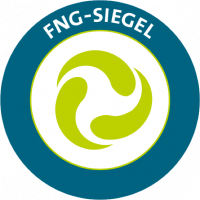FNG-LABEL
The FNG-Label is the quality standard for sustainable investment funds in German-speaking countries. The holistic methodology of the FNG-Label is based on a minimum standard. This includes transparency criteria as well as the consideration of labor and human rights, environmental protection, and anti-corruption, as summarized in the globally recognized key principles of the UN Global Compact.

In conjunction with the non-profit scientific association F.I.R.S.T., AIR as a research unit carries out the independent review and assessment work for the FNG-Label, which has until then been carried out by the Research Group on Sustainable Finance at the University of Hamburg. The Qualitätssicherungsgesellschaft Nachhaltiger Geldanlagen (QNG) bears overall responsibility, in particular for the coordination, awarding and marketing of the sustainability label.

EUROSIF
Since spring 2022, AIR has been working with the European Sustainable Investment Forum (Eurosif), the University of Hamburg and F.I.R.S.T. e.V. to develop standards for a clearer definition of sustainable investments with a focus on the contribution to a sustainable transition. Based on a published classification scheme for sustainable investments, AIR, Eurosif and the University of Hamburg are currently developing a methodology within the framework of a working group for future market studies. The work on this standard setting is intended to help make the positive contribution of financial flows more clearly ascertainable and transparent. Results are expected by the end of 2023.
To make the methodology practical for future market studies, the Swiss Sustainable Investment Forum (SSF), in cooperation with the University of Hamburg and AIR, is using the classification as the basis for a pilot study as part of this year’s Swiss Sustainable Investment Market Study. The pilot study tests the classification in practice to gather valuable insights and empirical values, especially for the innovative classifications “Impact Aligned” and “Impact Generating”. This will also benefit the Eurosif Working Group, which is responsible for integrating the new classification into future market studies. The Swiss Sustainable Investment Market Study has been published on June 27, 2023.
FEDERAL INITIATIVE IMPACT INVESTING (BIII)
In 2022, AIR also collaborated with the University of Hamburg, the Center for European Economic Research (ZEW) and the Federal Initiative Impact Investing (BIII) to produce the BIII’s market study “Impact Investing in Germany“. The impact-related categories of the above-mentioned classification scheme for sustainable investments were used as a basis. Here, important insights were gained for the implementation and practice-oriented further development of the classification, too.


ANALYSIS AND CLASSIFICATION OF SUSTAINABILITY RATINGS
Many providers of sustainable investment strategies use external sustainability ratings such as ESG or SDG scores. However, the underlying methodologies, indicators, and rating systems are often not transparent, and their analysis is very complex. It is therefore often difficult to make a meaningful selection of a sustainability rating that best fits one’s own investment approach.
Many providers of sustainable investment strategies use external sustainability ratings such as ESG or SDG scores. However, the underlying methodologies, indicators, and rating systems are often not transparent, and their analysis is very complex. It is therefore often difficult to make a meaningful selection of a sustainability rating that best fits one’s own investment approach.
The aim of the analyses is to enable a detailed assessment of the focus of sustainability ratings – is the focus of the rating on financial risks and opportunities with ESG relevance (financial materiality), or on the impact of companies on social and/or environmental matters (impact materiality)? Is a rating appropriately suited to capture sustainable investments according to SFDR?
The result of this analysis provides a detailed understanding of the objectives and functioning of sustainability ratings and can help to select the most appropriate rating.
SIA-AWARDS
Advanced Impact Research GmbH, together with SKILLS Communications, is the co-producer of the Sustainable Impact in Action Awards 2023 (SIA Awards). Since 2019, the SIA Awards annually honor outstanding impact projects in various environmental and social categories.
As Co-Producer, AIR focuses on evaluating the submitted impact projects and proposes certain projects as “SIA Impact Leaders” for specific categories. To evaluate these impact projects, AIR has developed an evaluation form inspired by the content of Duke University course on “Impact Management and Measurement for the SDGs” and the UNDP SDG Impact Standards.

As part of the assessment process, a SIA Impact Leader report is produced, which is inspired by the SDG Impact Standards and the recommendations of the Impact Management Platform. Subsequently, this report is submitted to the SIA Advisory Board for evaluation. This board, consisting of independent jury members, is responsible for the final decision on the awards.
By working with SKILLS Communications and judging the projects, AIR helps to recognize and promote the achievements of projects with positive social or environmental impact.
If you have knowledge of projects or are yourself part of a project that has a particular social or environmental impact and could be considered for the SIA Award, we welcome you to contact us: kontakt@air4p.org. Consider that also investor projects can receive a SIA Award.

INDIVIDUAL RESEARCH REQUESTS
For individual research requests on sustainability topics, eco-labels, or SRI criteria, please contact us at kontakt@air4p.org. We will be happy to get in touch with you.
